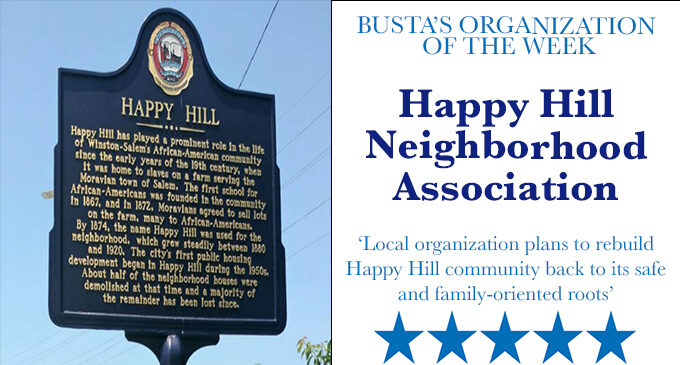Busta’s Organization of the Week: Local organization plans to rebuild Happy Hill community back to its safe and family-oriented roots

By Busta Brown
“Happy Hill is the first designated community for formerly enslaved people,” shared Tonya Sheffield. Tonya is the president of Happy Hill Neighborhood Association, who is working hard to preserve the Winston-Salem community’s rich history.
The Happy Hill community has a legacy of artists, doctors, lawyers, teachers, athletes, entertainers and more. “Our goal is to preserve what’s left of it in hopes of building, rebuilding, reclaiming what this community once was. We want people to understand this rich history, their connection to the ancestors that were there and to help revitalize this community – the energy, the knowledge and the awareness of their greatness.”
The organization is very proud of rebuilding Happy Hill back to the productive family-oriented community that attracted people from other cities to attend college locally. The Happy Hill Association community garden manager, Brenda Taylor, was one of them. “I moved to Happy Hill in the ‘70s to go to Winston-Salem State. Many of my friends did as well, and now have degrees from both Winston-Salem State University and North Carolina A&T.”
The rich history of Happy Hill goes back to the 1700s and 1800s. It became the first local community – possibly in the country – where former slaves were allowed to buy property, where they developed and built a self-sufficient community. The Happy Hill Neighborhood Association’s plan is to bring back that way of life for their residents.
According to Taylor, five presidents of Liberia were descendants of the Happy Hill community. “And every year, at the Happy Hill reunion, the Liberian Organization of the Piedmont and the Happy Hill reunion come together on that day, and they celebrate the connection every year,” said Sheffield.
Happy Hill Neighborhood Association has an annual art anthology that celebrates the community’s artists, whose works depict images of the community and the impact it has had on their lives. “We’re dealing with a traumatized community, so art is healing and creates unity. Art helps people express themselves in a way that is not seen as offensive, because you must judge it as art. It also allows you to see yourself and relate to things that help you feel accepted and inspires you to succeed,” said Taylor. She continued, “In life, art is very important, and you know, in all aspects of life. Whether you’re a senior citizen, in daycare or high school, art is a means of healing people.” The art anthology creates a venue where local artists, particularly those from Happy Hill, can perform and display their work depicting the history of the Happy Hill community.
Along with the Art Anthology, Happy Hill Neighborhood Association has a community garden as well. “At one point, the residents in Happy Hill had gardens and fruit trees, which are beautiful and sustaining for a community,” said Taylor. The residents learn how to garden as well. Taylor said that a garden has a way of unifying people. “Soil has a way of bringing people together. And after having this garden and people seeing it, many people want to be a part of this initiative of bringing about resources.”
“The garden is also a part of an ecosystem, so waste from Atrium cafeterias will go to a composting facility and that compost will go to two other farms and the garden at Happy Hill, creating bionutrient soil to produce bionutrient produce, which promotes a healthy gut. So, it’ll have more nutrients in the produce that we produce than what you will get at the grocery store,” shared Sheffield. Taylor added, “And this is eco-friendly and plays a major role in climate change. Because of the waste from the hospital’s Atrium, it goes back into the soil for feeding the people. ” The Association of Black Farmers are good friends of Happy Hill Neighborhood Association and are consulting with them through their development phase.
April 6 was the first time Happy Hill Neighborhood Association had a fresh produce giveaway. “We wanted to do it every weekend, but it’s not feasible. The farmers can’t give us enough produce every week like that. So, we need more partnerships and volunteers so that we can serve as many families as possible that need our support,” said Sheffield. Glow House Agriculture provides the 500 boxes of fresh produce, thanks to the support of their president, Courtney Austin Wilson, who is a sixth-generation Black farmer. The next Happy Hill fresh produce giveaway is April 27 from 10 a.m. to 2 p.m. in the Happy Hill community at the clock tower on the corner of Mock and Alder Streets.
On April 30 the Happy Hill Neighborhood Association invites the community to visit the Happy Hill cemetery. “There’s a company coming through to do radar ground penetrating, to go all over the entire graveyard to identify the hidden graves that we don’t have markers for. There were a total of 1,500 graves based on the records. A lot of traumas have happened to this community and we’re trying to repair,” shared Sheffield.
“Well, I always say, do to others as you would have them do unto you. And we must ask ourselves, what would Jesus do in all things? If we did that, I think that we would all be in a better place,” said Taylor.
My Organization of the Week is the Happy Hill Neighborhood Association. To volunteer in the Happy Hill community garden, located at 900 Free Street (rear parking lot), contact Brenda Taylor at btgardner1@gmail.com. To volunteer in the Happy Hill cemetery located at 888 Willow Street, email Tonya Sheffield at sheftalesproductions@gmail.com.









